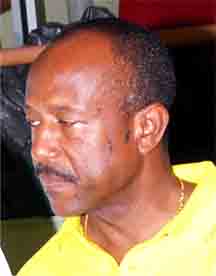Colin Klass’ 26- month ban “from taking part in any football-related activity (administrative, sports or any other)” is probably the best outcome that he could have hoped for.
By imposing an initial suspension on Klass pending last Friday’s hearing, FIFA had sent a clear signal that amongst the 16 Caribbean Football Union officials fingered in the bin-Hamman cash-for-votes scandal, it had a particular interest in the role that Klass had played. He could not have expected that he would return from Zurich unscathed.
 After the bin Hamman scandal had been blown open Klass had denied any knowledge of what transpired in Port-of-Spain last May. On Friday, in Zurich, the FIFA Ethics Committee ruled that Klass was guilty of, among things, failing to “disclose violations” which appears to be the same as saying that his earlier insistence that he had had no knowledge of the cash-for-votes occurrence was a falsehood.
After the bin Hamman scandal had been blown open Klass had denied any knowledge of what transpired in Port-of-Spain last May. On Friday, in Zurich, the FIFA Ethics Committee ruled that Klass was guilty of, among things, failing to “disclose violations” which appears to be the same as saying that his earlier insistence that he had had no knowledge of the cash-for-votes occurrence was a falsehood.
The verdict could have been worse. Klass could have been banned from football for life, which, in fact, was the expectation of sections of the local football community. Then, the completeness of FIFA’s verdict would have been a stain that he would have had to carry with him for the rest of his life.
What the lesser penalty does is to allow Klass to part company with the Guyana Football Federation (GFF) which he has served as its president since 1989 with at least a modicum of dignity. That way, he can slip into a condition of quiet retirement and reflect on his future outside of the game.
If Klass’ swift and sudden demise is bound to create some measure of dislocation for the federation, the option of waiting-out his 26- month ban, which, at least in theory, he might choose to pursue, is not only a less noble alternative but one which will place a further burden on a GFF that is now not only tarnished by what FIFA has had to say about its former president but also embroiled in a fracas with the Georgetown Football Association (GFA) which has landed in the courts.

It may well be an entire falsehood that Klass’ influence inside the federation persisted even during the period of his removal from the presidency and that the current acting President Franklyn Wilson could not occupy the physical space designated as the office of the president of the GFF even though he was serving legitimately in the position. On the other hand, assuming that these rumors are true, one wonders whether that may not be a sign that Klass has not entirely given up the likelihood of running the federation after his ban is completed. It is, admittedly, a somewhat far-fetched thought but one which, in the Kafkaesque world of local football, cannot be ruled out.
After all, Klass would have secured over the long period of his presidency, a network of key supporters. That apart, what appears to be the weakness of the various other officials who now run the federation may well tempt Klass to hang on, at least for as long as he can. That, decidedly, would be a callous option for a man who, presumably, has some measure of caring for the game and even if such thoughts may be lingering in his mind, they should not be permitted to be actualized.
Those considerations apart, Klass’ accomplishments as past president of the GFF entitle him to no such prerogative.
It would be best if the task of finding a successor to Klass is dealt with expeditiously though that is not to say that the process should be needlessly rushed. The worst thing that can happen is for a successor to emerge from a process of unseemly and incestuous in-fighting among those who may consider themselves to be strong contenders. Guyana’s football, given the dire circumstances in which it finds itself, requires capable, strong, committed, honest and influential leadership and there is no really persuasive evidence that all of those qualities repose in those considered the leading lights in football today. It may therefore well be worth the while not to confine the search within the portals of the football’s establishment for leadership if the game is to be salvaged.





